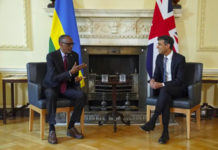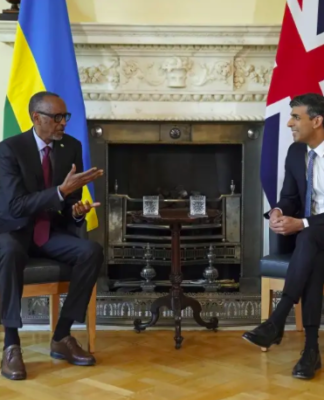By David Himbara
Anew era in U.S. geopolitical doctrine is waiting in the wings. American foreign policy in Africa has been in flux, and presidents since Ronald Reagan each deployed a signature policy initiative for Africa.
Reagan sponsored what he called “constructive engagement” to abolish White minority rule in South Africa, while George H.W. Bush sought to end civil wars in Angola, Ethiopia, Mozambique, and Somalia. Bill Clinton’s signature policy was the African Growth and Opportunity Act (AGOA), which opened the U.S. market to African exports. George W. Bush launched the President’s Emergency Plan for AIDS Relief (PEPFAR) to fight AIDS and malaria. He also established the Millennium Challenge Corporation for improving African infrastructure. Barack Obama sponsored three Africa initiatives. Power Africa aimed to mitigate chronic electricity shortages, Feed the Future initiative was to fight food shortages in Africa, and Obama’s Young African Leaders Initiative was designed to address a leadership deficit.
Meanwhile, Donald Trump’s four years at the helm degraded U.S.-African relations, and was accompanied by apparent disdain and indifference. This is about to change. President-elect Joe Biden has indicated that he will build robust U.S.-African relations, thereby reverting to pre-Trump active political and economic engagement.
Trump’s pattern of disdain for Africa marked a departure from previous U.S. presidents’ outlook and practice
In a limited way, Donald Trump followed in the footsteps of his predecessors by sponsoring his own African policy initiative. Trump’s signature Africa policy is known as Prosper Africa, whose objective is boosting trade and investment between the U.S. and Africa.
President Trump, however, sharply diverged from his predecessors in one important aspect. He was personally neither involved in his policy initiative nor in other aspects of U.S.-Africa relations. On the contrary, a disdain for Africa became one of his trademarks. For example, he instituted discriminatory visa restrictions against Sudan, Somalia, and Chad. Trump notoriously both described African nations as ‘shithole’ countries, and mispronounced the names of Namibia and Tanzania.
Under President Trump, foreign aid to Africa was gutted, which severely affected the region which is comparatively poorer than other parts of the world. In the 2018 U.S. budget, for example, the Trump administration cut the Department of State’s foreign aid funding by $10 billion or 28%. Further, he slashed funding for multilateral development banks, including the World Bank, by $650 million. Each year from 2017 to 2020 saw deep cuts in foreign aid, culminating in a cut of 21% in 2020.
President Trump also abandoned vital policy priorities that American governments traditionally championed in Africa for decades. Before Trump’s presidency, the U.S. was, for example, at the forefront of advancing and entrenching good governance, democracy and human rights. Trump moved in the opposite direction. Among the few African heads of state admired by Trump is the Egyptian military strongman Abdel Fattah el-Sisi, called a great and highly respected leader who ended chaos and brought order to Egypt by Trump himself.
Biden is set to renew U.S. engagement with Africa
The Biden administration is set to rebuild robust U.S.-Africa relations. President-elect Biden’s vision for American-African relations was published on October 22, 2020, in a document titled “The Biden-Harris Agenda for African Diaspora.” While the agenda is essentially a comprehensive plan for bolstering the socio-economic roles of citizens and immigrants of African descent living in the U.S., nonetheless, the Biden-Harris administration goals for Africa are well articulated in the plan.
According to the Biden-Harris statement, their administration’s primary goal in Africa is to renew U.S. engagement with the continent in four key areas as follows:
- Asserting commitment to democracy and governance as principles of U.S.-Africa engagement.
- Reinvigorating diplomatic relations with African governments and the African Union.
- Ensuring the U.S. Government and Foreign Service reflect American citizenry, including African diaspora professionals.
- Continuing the Young African Leaders Initiative, and deepening commitment to engage with Africa’s young leaders.
The Biden-Harris vision is, therefore, a repudiation of Trump’s abandonment and disdain for Africa. More importantly, this is a return to a broad-based U.S. engagement with Africa that characterized American administrations from Reagan to Obama.
Who will lead the day-to-day implementation of Biden-Harris Africa agenda?
The next important step in renewing American-African relations is the appointment of leaders for the U.S. Department of State and its Bureau of African Affairs. Biden has a considerable talent pool from which to choose experienced policymakers to lead his effort for Africa. Among them is Linda Thomas-Greenfield, the former Assistant Secretary of State for African Affairs and former U.S. Ambassador to Liberia. There is Susan Rice, who has held a number of senior positions, including Assistant Secretary of State for African Affairs, U.S. Ambassador to the United Nations, and U.S. National Security Advisor. Representative Karen Bass follows African affairs closely in her capacity as Chair of the U.S. House Foreign Affairs Subcommittee on Africa, Global Health, Global Human Rights and International Organizations.
There are many other Americans capable of leading the effort of building robust U.S.-Africa relations. The important breakthrough is that we are about to witness a renewed U.S.-African relationship that was acutely missed by Africans and Americans alike during the Trump administration’s record of indifference. President-elect Joe Biden has given the signals that his administration’s signature policy will represent a reversal of this record, and holds promise for a new era in U.S.-Africa relations.

David Himbara, PhD, is an educator, author, and professor of international development based in Toronto, Canada. He previously headed strategy and policy for the president of Rwanda. Himbara has consulted extensively for governments including South African government and for organizations such the African Development Bank. Himbara taught political economy at universities in South Africa and the US.






























































